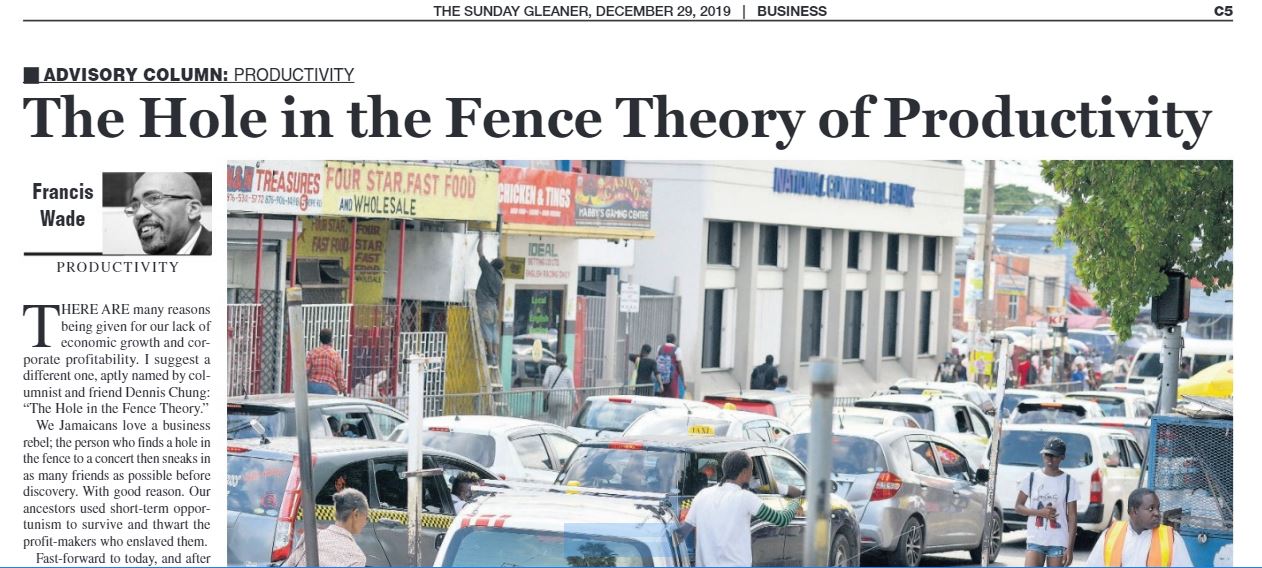There are many reasons being given for our lack of economic growth and corporate profitability. I suggest a different one, aptly named by columnist and friend Dennis Chung: “The Hole in the Fence Theory.”
We Jamaicans love a business rebel; the person who finds a hole in the fence to a concert then sneaks in as many friends as possible before discovery. With good reason. Short-term opportunism helped our ancestors oppose and survive the profit-makers who took us as slaves for the first workplaces.
Fast forward to today and, after centuries of practice, we still celebrate the rebel…until he gets in our way. A taxi driver forms a new lane. An employee steals goods and time. A high-ranking official orders an expensive cake for his boss’s birthday.
We are quick to brand such highly visible instances as “Corruption!”…with a capital C. However, most of the daily holes in our fences are “small.”
Case in point: Many companies require employees to sign in upon arrival. I worked for a firm in which (amazingly and impossibly), 90% of the employees “arrived” at precisely 8:30 am. One day, a new employee entered a truthful time of 8:31 am. He was roundly chastized by subsequent arrivals, one of whom “corrected” his entry in the log.
Obviously, he just didn’t understand the “runnings”: his unspoken role in keeping a “small” hole in the fence open.
How can we transform our cultural tendency to exploit such short-term advantage-taking?
1. Treat Integrity as if it’s Mission Critical
I remember making fun of the cadets as a Wolmer’s student. Not only would they march in the sun in boots and long pants, but their preparations for the annual inspection involved copious use of Brasso and melted shoe polish: hilarious extremes.
However, as an adult, I now appreciate the JDF’s high standards. Belatedly, the connection between shiny shoes and life-saving mission readiness is apparent.
Truth: I only learned the lesson after volunteering in an organization that made a big deal of strong standards. For example, the layot of tables for public events was seen to be as important as the integrity of the payment process. The argument was simple: when small things go wrong, expect big ones to follow.
How can this level of integrity be operationalized?
2. Set up Tests for Small Slackness
Van Halen, the popular Rock band, had a requirement that concert promoters provide a bowl of M&M’s in their dressing room…with the brown candies removed. Upon arrival at a new location, the band’s manager would examine the bowl, and if the instruction were ignored, would stop everything. He then initiated a painful, line-by-line review of the contract to ensure that every provision, especially those which were safety critical, had been followed.
In other words, like a military operation, these musicians knew how to set up flags for early, small and seemingly insignificant signs of slackness. Imagine if your employees cared to do the same?
3. Educate and Unleash People
Unfortunately, slackness tests are probably not happening soon. As a citizenry, we are culturally blind to the cause-and-effect relationships which drive success. While a few can rise to a big occasion such as a Miss World pageant, a 100 meter final or a mega-concert overseas, most of us don’t see the hidden connections between personal slackness and operational failure.
We need to learn that mega-national successes (such as Singapore’s) aren’t wrought by individuals. Instead, they only accrue to groups of people who practice reporting holes in fences to those who can fix them. In other words, they find a way to repair integrity breaches because of its unique role: serving every citizen.
Conversely, mega failures aren’t caused by only taxi drivers and criminals. When we collectively abandon high standards both organizations and our country suffer. In this context, more stringent enforcement of laws will fail – there will never be enough policemen or legal statutes to produce a transformation.
Instead, this is inside-out work. There’s an inner restraint our citizens need to learn in which we sacrifice our immediate, personal appetite for gain for the greater good. We should help save the life of the driver of an overturned truck, rather than joining the mob grasping at his goods.
The happy news is that “we likkle but we tallawah,” like a powerful locomotive train. However, without reliable tracks we’ll continue to scare off investors and tourists, alike.
Their reaction is a sign: if we don’t get serious about our slackness, we’ll remain world famous…except it will be for our weak production, lack of innovation and poor GDP performance.

